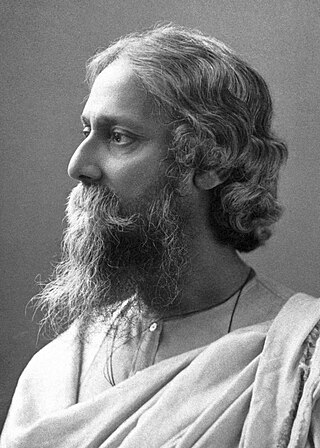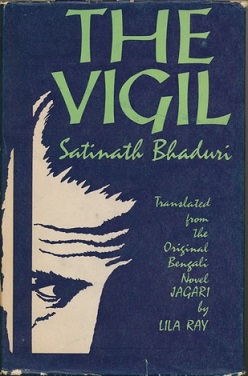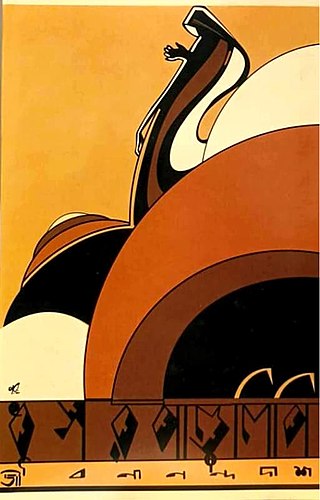Related Research Articles
Indian poetry and Indian literature in general, has a long history dating back to Vedic times. They were written in various Indian languages such as Vedic Sanskrit, Classical Sanskrit, Ancient Meitei, Modern Meitei, Telugu, Tamil, Odia, Maithili, Kannada, Bengali, Assamese, Hindi, Marathi and Urdu among other prominent languages. Poetry in foreign languages such as English also has a strong influence on Indian poetry. The poetry reflects diverse spiritual traditions within India. In particular, many Indian poets have been inspired by mystical experiences. Poetry is the oldest form of literature and has a rich written and oral tradition.
Anita Desai, is an Indian novelist and Emerita John E. Burchard Professor of Humanities at the Massachusetts Institute of Technology. She has been shortlisted for the Booker Prize three times. She received the Sahitya Akademi Award in 1978 for her novel Fire on the Mountain, from the Sahitya Akademi, India's National Academy of Literature. She won the Guardian Prize for The Village by the Sea (1983). Her other works include The Peacock, Voices in the City, Fire on the Mountain and an anthology of short stories, Games at Twilight. She is on the advisory board of the Lalit Kala Akademi and a Fellow of the Royal Society of Literature, London. Since 2020 she has been a Companion of Literature.

P. Sachidanandan, who uses the pseudonym Anand, is an Indian writer, writing primarily in Malayalam. He is one of the known living intellectuals in India. His works are noted for their philosophical flavor, historical context and their humanism. He is a recipient of the Sahitya Akademi Award and three Kerala Sahitya Akademi Awards. He is also a recipient of Ezhuthachan Puraskaram, Vayalar Award, Odakkuzhal Award, Muttathu Varkey Award, Vallathol Award and Yashpal Award. He did not accept the Yashpal Award and the Kerala Sahitya Akademi Award for Novel.

Mani Sankar Mukherjee is an Indian writer in the Bengali language, who also served as the Sheriff of Kolkata. He grew up in Hindmotor of West Bengal.

Bengali literature denotes the body of writings in the Bengali language and which covers Old Bengali, Middle Bengali and Modern Bengali with the changes through the passage of time and dynastic patronization or non-patronization. Bengali has developed over the course of roughly 1,400 years. If the emergence of the Bengali literature supposes to date back to roughly 650 AD, the development of Bengali literature claims to be 1600 years old. The earliest extant work in Bengali literature is the Charyapada, a collection of Buddhist mystic songs in Old Bengali dating back to the 10th and 11th centuries. The timeline of Bengali literature is divided into three periods: ancient (650–1200), medieval (1200–1800) and modern. Medieval Bengali literature consists of various poetic genres, including Hindu religious scriptures, Islamic epics, Vaishnava texts, translations of Arabic, Persian and Sanskrit texts, and secular texts by Muslim poets. Novels were introduced in the mid-19th century. Nobel laureate Rabindranath Tagore is the best known figure of Bengali literature to the world. Kazi Nazrul Islam, notable for his activism and anti-British literature, was described as the Rebel Poet and is now recognised as the National poet of Bangladesh.

Parutholli Chalappurathu Kuttikrishnan, popularly known by his pen name Uroob was an Indian writer of Malayalam literature. Along with Basheer, Thakazhi, Kesavadev, and Pottekkatt, Uroob was counted among the progressive writers in Malayalam during the twentieth century. He was known for his novels such as Sundarikalum Sundaranmarum and Ummachu, short stories like Rachiyamma and the screenplays of a number of Malayalam films including Neelakuyil, the first Malayalam feature film to receive the National Film Award. He was a recipient of several honours including Kendra Sahithya Academy Award and the inaugural Kerala Sahitya Akademi Award for Novel.
Sombhu Mitra was an Indian film and stage actor, director, playwright, reciter and an Indian theatre personality, known especially for his involvement in Bengali theatre, where he is considered a pioneer. He remained associated with the Indian People's Theatre Association (IPTA) for a few years before founding the Bohurupee theatre group in Kolkata in 1948. He is most noted for films like Dharti Ke Lal (1946), Jagte Raho (1956), and his production of Rakta Karabi based on Rabindranath Tagore's play in 1954 and Chand Baniker Pala, his most noted play as a playwright.

Amiya Chandra Chakravarty (1901–1986) was an Indian literary critic, academic, and Bengali poet. He was a close associate of Rabindranath Tagore, and edited several books of his poetry. He was also an associate of Gandhi, and an expert on the American catholic writer and monk, Thomas Merton. Chakravarty was honoured for his own poetry with the Sahitya Akademi Award in 1963. He taught literature and comparative religion in India for nearly a decade and then for more than two decades at universities in England and the U.S. In 1970, he was honoured by the Government of India with the Padma Bhushan award.
Kainikkara Padmanabha Pillai (1898–1976), popularly identified as Swathithirunal Kainikkara Padmanabha Pillai after his magnum opus, Swathithirunal, was an Indian author of Malayalam literature, actor, speaker, teacher and thinker. He was known for his plays which dealt with themes such as patriotism, sacrifice and justice and his characters showed heroism, showing influence of William Shakespeare. Kerala Sahitya Akademi awarded him their annual award for drama in 1970. He was also a recipient of the Kalyani Krishna Menon Puraskaram.
Khagendranath Mitra (1896–1978) was a writer for children of Bengal. Even today his writings continue to be popular among children and preteens.

Those Days is a historical novel by Indian writer Sunil Gangopadhyay. It was first published as a serialized novel in the Bengali literary magazine Desh. Gangopadhyay won the Sahitya Akademi Award for the novel in 1985.
Sankari Prasad Basu was an Indian scholar, writer and critic who writes mainly in the Bengali language. He is a researcher on Swami Vivekananda and his books on the subject include Sahashya Vivekananda and Bandhu Vivekananda. One of his notable publications is his seven-volume research work Vivekananda o Samakalin Bharatbarsha, for which he won the prestigious Sahitya Akademi Award in 1978.

Jagari or Jagori is a Bengali novel written by Satinath Bhaduri. The novel is considered to be a master-piece of Indian literature and it was first published in 1945. It is a semi-autobiographical novel and it is set in the 1940s's during the Quit India Movement.

Ujjal Singha is a Sahitya Akademy prize winning poet based in Kolkata. Born in Garshimula village of Jamtara district in Jharkhand, Singha obtained his master's degree in Bengali from University of Calcutta. He first started off as an official in a nationalised bank in Kolkata and kept on writing poetry and other literary works. He quit job in 2001 to become a full-time poet. He is also an essayist and translator into Bengali from Hindi, English and French. He received Sahitya Akademi Translation Prize in 2009 for translating Mitro Marjani into Bengali from Hindi. He also translated poems of French poet Franck André Jamme . He has more than 20 books of poems and translations. He has been editing a poetry magazine Ghorswar for over 25 years. A Senior Research Fellow working on poetry and poetics by Department of Culture, and was awarded the Government of India Prize for a book written on environmental pollution.

Radharaman Mitra was a revolutionary involved with Meerut Conspiracy Case and Bengali writer. In 1981, he received Sahitya Akademi Award for his book Kalikata Darpan.

Ramapada Chowdhury was a Bengali-language novelist and short story writer in India. For his novel Bari Badle Jay, he received the Sahitya Akademi Award in 1988. He was also a recipient of the Rabindra Puraskar and several other awards. He won the Rabindranath Tagore Memorial International Prize in its inaugural year. Many of his works have been adapted into films, including the multiple-award-winning Kharij, directed by Mrinal Sen, and Ek Doctor Ki Maut, directed by Tapan Sinha. Chowdhury started writing during the Second World War. He was associated with Anandabazar Patrika for many years, and edited its Sunday supplement. His novels are marked by an economy of expression. He is one of the most well known short story writers in contemporary Bengali literature.
Vasupurath Unnikrishnan Nair was an Indian writer of Malayalam literature, best known as a contemporary and associate of Vallathol Narayana Menon. He was the author of a number of books which include Tagorinte Nadakangal, the translation of three plays written by Rabindranath Tagore into Malayalam. Nair honoured by the Kerala Sahitya Akademi with the distinguished fellowship in 1981.

R. Narayana Panickar was an Indian essayist, playwright, translator, lexicographer, novelist and historian of Malayalam. He was credited with over 100 books but the best known among them are the seven-volume work, Kerala Bhasha Sahitya Charitram, a comprehensive history of Malayalam literature up to 1951 and Navayuga Bhasha Nighantu, a lexicon. He also wrote a number of novels and translated several works including Purananuru, Akanaṉūṟu and Silappatikaram. He was also a historian and published works such as Thiruvithamkoor Charitram and Kerala Charitram. Sahitya Akademi honoured him with their annual award in 1955.

Shesh Namaskar is a 1971, Indian, Bengali-language novel that was written by Santosh Kumar Ghosh. The novel, which is considered to be its author's magnum opus, is written in the form of a series of letters from a son to his deceased mother. It won the Sahitya Akademi Award in 1972.

Dhusar Pandulipi or Dhusor Pandulipi is a collection of poems by Jibanananda Das. The book was first published in 1936. This poem collection was the first successful attempt in Bengali language, that did not have Tagorian influence.
References
- ↑ Sahitya Akademi (1990). Sahitya Akademi awards: books and writers : 1955-1978. Sahitya Akademi. p. 31. ISBN 978-81-7201-014-0.
- ↑ Aruna Chakravarti (2006). The Way Home: Contemporary Bengali Short Fiction. Penguin Books. p. 277. ISBN 978-0-14-400106-4.